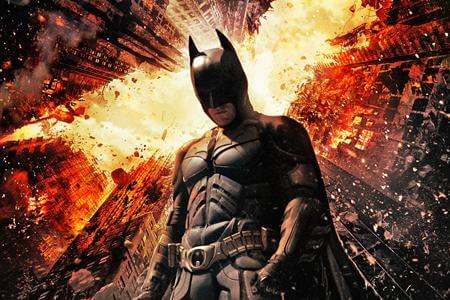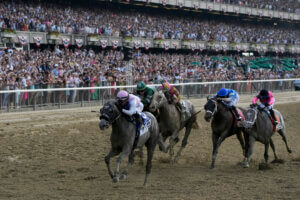 The Dark Knight Rises [4/5 stars]
The Dark Knight Rises [4/5 stars]
If the “Dark Knight Trilogy” has one theme that captures each film both on and off the screen, it is most definitely escalation. With 2005’s Batman Begins and 2008’s The Dark Knight director Christopher Nolan has flushed out everything in Batman’s world and created an all-encompassing scope that is of undeniably epic proportions. That being said, Nolan’s third entry into the bat-canon, The Dark Knight Rises, truly had a lot to live up to. Luckily, Nolan delivers a film that will satisfy audiences and reward the faith fans placed in him.
The Dark Knight Rises is a mammoth film that never fails to entertain and engage its audience. Though the film is far from perfect, it completes Nolan’s trilogy in grandiose fashion. Where Batman Begins proved to be a complex and intimate approach to Batman’s motivations and psyche, The Dark Knight was a tense and undeniably potent crime drama focused on Batman’s existence and his relationship with Gotham City (and its inhabitants). In cumulative contrast, The Dark Knight Rises (TDKR) is an all out examination of an older Batman/Bruce Wayne’s fragmented conscious and the collapsing ideals of truth and justice in Gotham City.
Like Nolan’s last two bat-films, TDKR sticks to its morals and relies on story and cast more than cheap fluff and spectacle that comprises many current blockbusters. The story borrows from Charles Dickens’s literary classic A Tale of Two Cities, as it touches upon the social and political effects of the escalation of crime within a city. Though the story is tight, the pacing is sometimes patchy, which results in some imbalances. The threequel is set 8 years after the events of The Dark Knight (TDK). Gotham officials, namely Commissioner Gordon, have covered up Harvey Dent’s actions as Two-Face by using Batman as a scapegoat. As a result, Batman is now seen as villain in the public eye, but Harvey Dent’s legacy of justice is able to live on. Gordon and Batman use Dent’s example and ‘sacrifice’ to ‘galvanize’ Gotham, which is then able to rid itself of organized crime. Bruce Wayne/Batman then sets off in self imposed exile until a new menace, here in the the form of Bane, comes to claim Gotham City. NOTE: The story is much more intricate and dynamic, but you’ll have to see it for yourself to figure out the finer complexities.
The utilization of cast is masterful, as plot threads are sewn together through an array of believable and tangible performances. Bat-veterans Morgan Freeman (Lucius Fox) and Michael Caine (Alfred Pennyworth) return to demonstrate their vulnerability and unflinching faith in Christian Bale’s Bruce Wayne/Batman. Anne Hathaway (Catwoman/Selina Kyle) delivers a memorable performance that helps link the story’s strands of mysticism from Begins with the realism of TDK. Tom Hardy is a serviceable villain in the form Bane. Hardy creates an intriguing character through eccentric body language, an eerie vocal performance, and impressive physical stature. Rounding out the rest of the cast most notably is Gary Oldman’s seasoned Commissioner Gordon, Joseph Gordon-Levitt’s rookie cop John Blake, and Marion Cottilard’s Miranda Tate.
As stated above, Tom Hardy delivers a solid and memorable performance; however, his character’s potential is never fully realized. Where Liam Neeson’s Ra’s Al Ghul (Batman Begins) was dynamic, and Heath Ledger’s Joker (TDK) mesmerizing (to say the least), Hardy’s Bane fails to capture the magnetism of his predecessors’. This is in part due to slight mischaracterization and unbalanced motivations inherit in the plot. Though this is noticeable, it far from condemns the film.
Another character that feels a little slighted is Gotham City. Throughout the last two films Gotham City is developed almost as a character; yet, in the threequel Gotham feels a little foreign. The average citizens are present, but they lack the identity and voice defined in previous films. Also, the city previously used for Gotham, Chicago, is now compounded with many New York City landmarks. Though this helps to expand the overall magnitude and scale of the city, it is slightly disjointing and somewhat alienating for audiences.
Though the cast and story of TDKR are the focal points, the film is not without spectacle. Mixing between practical and computer based effects, Nolan creates a number of engaging set pieces. The action here is a nice departure that shows the evolution of both the times and characters. The fight sequences do not seem as stylized as the martial arts of the first film. Instead, they feel more desperate and less restraint, similar to Ledger’s Joker in his final confrontation with Batman in TDK. This evolution of style serves as a mechanism to further show how the stakes have been raised, and the scale broadened.
Another notable aspect of the film is Hans Zimmer’s score. Zimmer provides his most refined body of work here. With haunting themes that reinforce the story at every turn, Zimmer is able to draw audiences into a scene and fully immerse them in the story. Zimmer effectively utilizes themes from previous films, which proves helpful in further reinforcing the scale of the film. Though Danny Elfman’s scores were iconic Batman with Tim Burton’s Batman films, Zimmer deliver’s a much more emotional theme that reflects the realism, depth, and scale of Nolan’s films.
Though TDKR is a very different film than that of its immediate predecessor (much as TDK was from Begins) the two films will undoubtedly be compared. Though The Dark Knight Rises may not stand up to The Dark Knight, it is a film that takes Gotham City and all its inhabitants to the next level. Nolan progressively built characters and story with his audience, which ultimately makes his conclusion all the more personal and poignant. All in all, The Dark Knight Rises breaks away from the curse of great trilogies to deliver a competent, satisfying, and memorable conclusion to what will be undoubtedly remembered as one of the greatest and most epic film trilogies.



























